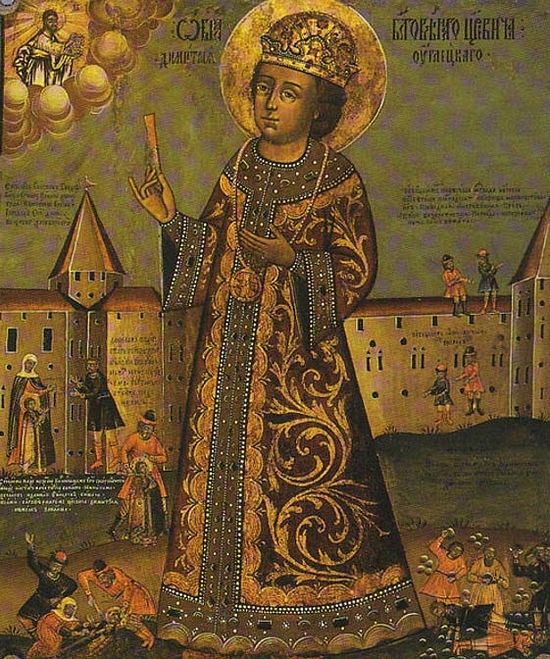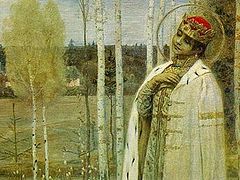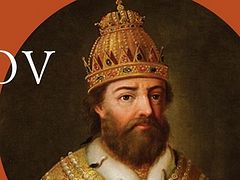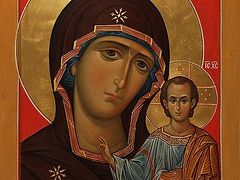The details of Russian history read like a parable of Christian moral teaching. Having stepped upon the path of holy Orthodoxy, the Russian people became God’s people; but as we know, the Lord chasteneth whom He loveth, that they might be His true children. Reading of such distant personages as Tsarevich Dimitry and the anti-Dimitries, or “false Dimitries”, we Orthodox Christians are drawn to look at our own selves, at how our own human ambitions can lead us to destroy what is innocent and authentic, and what terrible consequences this can bring for us and everyone around us. But it is always possible to summon courage and faithfulness to Christ, which will save us and lead us out of out of the chaos we ourselves have caused.
But let us begin by turning our gaze to a young boy who had been banished to the Russian town of Uglich.
Dimitry was the youngest son of Tsar Ivan IV, known as Ivan the Terrible. This Tsar lost his first wife whom he loved dearly, and suffered mental deterioration, which resulted in a series of failed marriages and the loss of competent heirs. Dimitry was born to his seventh wife.
Ivan the Terrible’s son Feodor Ivanovich (1557 – 1598) inherited the throne, and married the sister of one of his advisors, Boris Godunov, a boyar. Feodor was feeble-minded, and therefore his advisor was de facto running the country.
But the role of a faithful servant to the ineffective yet nonetheless rightful tsar and to his countrymen was not enough for the ambitious and politically savvy Godunov. Not long after Ivan the Terrible died, Godunov had the only bloodline heir exiled along with his mother to Uglich. Because his sister and Tsar Feodor had produced no children, Boris thought it best to fill the position himself once Feodor died.
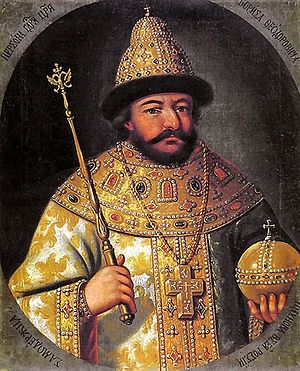 Tsar Boris Godunov. Wikipedia.
Tsar Boris Godunov. Wikipedia. If there is any doubt about Boris Godunov’s desire to become tsar, Fr. Job Gumerov (Sretensky Monastery) cites several incriminating facts.[1] While Tsar Feodor Ivanovich was still alive, Godunov attempted to declare Dimitry illegitimate, since the Orthodox Church does not bless more than three marriages, and Dimitry’s mother was Ivan’s seventh wife. The reason for this is obvious—his illegitimacy would disqualify Dimitry as heir to the throne. In 1586, the boyar Ivan Shuisky and others began pleading with Tsar Feodor to divorce his wife Irina so that he might remarry to produce an heir. Their plea was supported by Metropolitan Dionysy. Godunov countered this by persuading the Tsar that his sister was healthy and virtuous, and could still have a child. If not, he said, there is still Dimitry. This contradiction of his prior claim that Dimitry was illegitimate shows Godunov’s political deftness and doublespeak. The divorce did not happen, but Godunov never forgave the boyars—he had them all executed or exiled for treason. Metropolitan Dionysy and Archbishop Varlaam interceded with the Tsar for the persecuted boyars and complained of Godunov, and these hierarchs too were soon deposed and exiled.
But the child heir remained in his path. As the “New Chronicles” state, “Boris exiled Dimitry to Uglich, there to poison him. The righteous Tsarevich Dimitry was fed mortal poison in his food and drink, but God preserved the righteous one, not wanting to hide his righteous soul but to show his righteous soul and innocent blood to the whole world” (ПСРЛ, т.XIV, с. 40). The same chronicle describes how the tsarevich was murdered by people Boris Godunov had sent to do the odious task in Uglich on May 15/28, 1591. The tsarevich was at the Liturgy in the Church of the Transfiguration, as he was want to do every day. He partook of the prosphora, was given something to drink, and then his nanny took him out for a walk. He was ambushed and his throat slit with a knife.
When Tsar Feodor heard of his little brother’s death he was very grieved and wanted to go directly to Uglich, but Godunov held him back, sending instead his own men to conduct an “investigation”. The official version invented by his investigators stated that the Tsarevich had been playing with a knife when he had an epileptic fit and fell on the knife. It was a pitiful attempt to cover up the truth before Tsar Feodor, and not everyone supported it. One boyar, Michael Nagoi, testified even under torture that the child had been murdered. Fifteen years later, Metropolitan Philaret (Gumilevsky), bishop Feodosy, and four boyars went to Uglich to uncover Dimitry’s remains. They reported to the Tsar that, “When the coffin was opened, the tsarevich’s relics were seen to be whole and incorrupt…” It was also seen that his throat had been slashed and not merely punctured, as Godunov’s men had falsely stated.
After the tsarevich’s relics were uncovered, many miracles of healing occurred for people who came to venerate them. There were especially many healings of the blind. These miracles continue even to this day.
The murder of an innocent, pious boy is bad enough, but the tsarevich was also the rightful heir to the throne. The significance of this can only be understood by knowing that according to the monarchical principle that Russia inherited from the Christian empire of Byzantium and the Old Testament kings before it, the Tsar is the anointed one of God, blessed to serve his people by leading them, in the fear of God, acknowledging Christ as the supreme Sovereign of Christians. The crime of regicide has serious implications, because the king’s authority comes from God. It is interesting to note that Soviet history books cited not the Chronicles or the reports fixed after the exhumation of the tsarevich’s remains, but the full-of-holes “investigation” made by Godunov’s men. The Bolsheviks committed the very same crime by murdering Tsar Nicholas II, and the bloody chaos that ensued after the Bolshevik revolution mirrors what happened during the Time of Troubles, right down to the famine that wiped out a third of Russia’s population in 1601-1603.
When Tsar Feodor Ivanovich died in 1598, Godunov was elected by a Great National Assembly (Zemsky Sobor). Although he was successful as Feodor’s regent, Godunov’s brief reign was immediately marked by failures. The summer of 1601 was very cold, and there was massive crop failure in Russia, causing the famine that killed two million people. From there the country began to fall apart at the seams. Most of the aristocracy did not respect Godunov, unrest was everywhere, and crime and plague ravaged the population. He was generally regarded as a usurper, and rumors began circulating that Tsarevich Dimitry was not dead but in hiding. These rumors based upon people’s wishes combined with the desire among many to depose Godunov and continue the lawful succession made it possible for three False Dimitrys to invade the Moscow Kremlin. This chaos and impersonation was also put to use by Russia’s enemies to the West—the Polish-Lithuanian Commonwealth and Sweden.
Boris Godunov died in 1605 of a stroke, and the first False Dimitry seized power with the help of the Polish-Lithuanian Commonwealth. Thus began the Dimitriad wars, which would cause widespread devastation across Russia. The Russians might even have accepted Polish rule if it were not for Poland’s determination to destroy Orthodoxy and make Russia Catholic. This agenda eventually caused uprisings, followed by cruel reprisals. One example of Polish vengeance against the Russians took place in the same town where Tsarevich Dimitry was murdered—Uglich. This massacre was also recorded in the Uglich Chronicles. The Orthodox monks of the Uglich monasteries and many laypeople who meekly and consciously went to their deaths are, although not officially glorified by the Church, remembered as martyrs for the Orthodox faith:
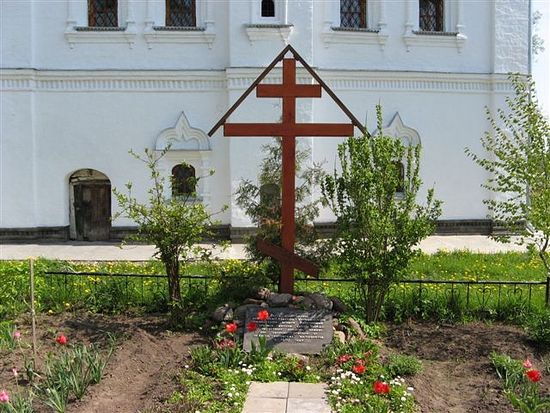 A cross with a plaque dedicated to the people of Uglich martyred by the Poles, St. Nicholas Monastery. Photo: Vladislav Burlutsky.
A cross with a plaque dedicated to the people of Uglich martyred by the Poles, St. Nicholas Monastery. Photo: Vladislav Burlutsky. In 7117 (1609)
Then came the Poles and Lithuanians and ran up to that wondrous and beautiful monastery, and encamping round about it like bees around a honeycomb and like wolves around these rational sheep, wanting to force to capitulate them and take them all the sooner. The Abbot and brothers, and all the citizens and layfolk taking cover in the monastery and not allowing it to be destroyed, defending the fortress and guarding the gates, did not know that there was such a multitude of vengeful enemy forces. The Lithuanians fought mightily and overcame the citizens.
When the citizens saw that they were overcome by the many Lithuanian fighters, all went into the old stone cathedral, and asking entrance into this fortress, they celebrated the Divine Liturgy, receiving the Holy Mysteries, the Body and Blood of Christ, all preparing themselves for the hour of death.
After receiving the Holy Mysteries, the abbot, named Barsanuphius, taught all about death, that the brothers and other people in the church might not fear it. And none feared death but rather rejoiced that they were deemed worthy of a martyr’s end, and to inherit the Kingdom of Heaven along with the martyrs. The Poles were fighting their way to the doors of the church, and unable to break them down as they were very strong, dispersed. They returned from the monastery shamed, and the Poles left the monastery.
After his teaching the priest put on his priestly vestments, and choosing for himself those who would drink the cup of death with him twenty-seven brothers, he took into his hand the honorable cross and kissed it, saying, “Rejoice, most honorable cross of the Lord! For Him Who was crucified on Thee do we lay down our lives.”
Giving holy icons to some of the twenty-seven brothers, singing hymns of prayer and reverently kissing one another, they went out of the monastery gates in hopes of softening the hearts of their enemies, to plead with them not to bring evil upon the holy monastery. But the wicked Lithuanians who stood guard like lions chasing after the venerable monks cut off Abbot Barsanuphius’s head. The Poles not far from the monastery, hearing the loud cries, returned once again to the monastery. And they began slashing away at the brothers, killing the twenty-seven and hacking them to pieces. The band headed for the cathedral and began to cruelly beat down the doors, but they were not able to break them, though they beat at them hard; while those within prayed with tears to God. And seeing that they were having no success beating down the doors, the wicked ones conceived a fierce revenge: they dug a deep ditch around the cathedral and broke down the foundation.
Then—O longsuffering Christ!—they climbed under the church walls where there was a deep cellar and bashed the high stone walls, destroying the columns and breaking the foundation, and the ceiling shattered, and the church fell with a loud crashing, crushing all those within. All the monks and laypeople who were in the church were crushed by the falling building. The surviving servants of the church say that up to fifty monks were killed in the stone building, along with about two thousand laypeople. All those in the church were buried, and the church became their common grave. There was such a thundering when the cathedral fell that ten versts [6.6 miles] away the Christians hiding in the forest heard it, and these people left trustworthy testimony that it was like thunder throughout the forests and valleys, and the earth shook to its bowels.
Also destroyed by the same evil-believing Lithuanians was the Uleimensk St. Nicholas Monastery in that city. Many other Christians folk where killed, and all the sacred shrines were abused and plundered…[2]
The Russian opera based upon Pushkin’s work about Boris Godunov reflects the general feeling among Russians that Godunov’s murder of the innocent child and heir to the throne set in motion the chain of events that would cause great death, sorrow, and suffering in the Russian land. “My soul is heavy, some instinctive fear with ominous foreboding rivets my heart...” Boris says as he accepts his coronation. And in Act 1 Scene 1 we see the wise monk Pimen writing a truthful chronicle of the Russian state, revealing the secret of Tsarevich Dimitry’s murder:
“Boris! Boris! All tremble before you, no one dares to remind you of the fate of the hapless infant... But meanwhile a hermit in a dark cell is writing a terrible denunciation against you. And you shall not escape human judgment, as you shall not escape the judgment of heaven!” sings Pimen’s cell attendant, Grigory, who then escapes to Lithuania to become the first False Dimitry.
In Scene 5 we see God’s judgment pronounced through the lips of a clairvoyant fool-for-Christ. Starving people are crowding in Red Square, and some street urchins steal a kopeck from the holy man. Tsar Boris comes out of St. Basil’s Cathedral to the crowds shouting, “Bread, bread! Give the starving bread! Give us bread, father, for the sake of Christ!” The fool-for-Christ turns to Tsar Boris and says regarding the urchins, “Order them to be killed, as you killed the little Tsarevitch.” When Boris asks for prayers, the holy man cuts him to the quick: “It can’t be done! How can one pray for a Tsar Herod!”
Later, as the False Dimitry surrounded by troops, Polish gentry, and Jesuits ride into Moscow, the fool-for-Christ cries out like an Old Testament prophet: “Flow, flow, bitter tears, Cry, cry, Russian Orthodox soul! Soon the enemy will come and darkness will fall, Black, impenetrable darkness...”[3]
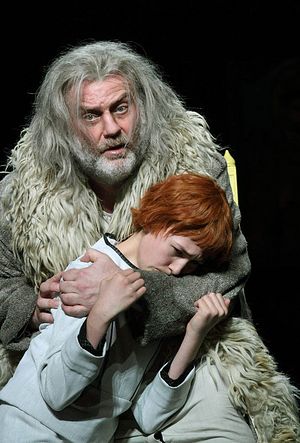 Bryn Terfel as Boris Godunov in the opera by Mussorgsky, trying to protect his son Feodor. Photo: The Guardian.
Bryn Terfel as Boris Godunov in the opera by Mussorgsky, trying to protect his son Feodor. Photo: The Guardian. Godunov's own son was soon killed after his death, and his wife strangled.
We can call this no more than popular literature and fantasy, but it definitely gives voice to a moral teaching that at the beginning of this article we have tried to internalize. Ambitions, pride, and dreams of grandeur dressed up for decency’s sake in “what’s best for everyone” leave us abandoned by God’s grace and prey to our most vicious enemies. If we do not pull ourselves together and unite nobility of soul with humility and determination, mustering our resources, all can be lost. These qualities are personified once again in Russian history by Prince Pozharsky and the Novgorod merchant Kuzma Minin, who united forces and rallied the people to victory over the Catholic Polish invaders. Continuing this mystical symbolism comes the son of the holy Metropolitan Philaret of Moscow, whom the Grand National Assembly elects as the new Tsar, initiating the Romanov dynasty. This dynasty would also end with the death of another child-heir, the holy Passion-Bearer Tsarevich Alexy, son of Tsar Nicholas II, at the hands of yet another band of godless usurpers ready to commit any atrocity “for the sake of the people."
Will we never learn from our mistakes?

